Abstract
In this study we examined the relationship between premorbid functioning, outcome, cognitive functioning and positive and negative symptoms of schizophrenia. Cognitive functioning and symptoms were examined longitudinally in a sample of 39 subjects with schizophrenia (according to the DSM-III criteria). Subjects were assessed at admission to hospital and six months later during a period of relative remission. Premorbid functioning was significantly associated with negative symptoms but not with positive symptoms at both the acute phase and the remitted phase of the illness. Outcome was also associated with negative symptoms at admission and with both positive and negative symptoms at follow-up. Deficits on cognitive tests of verbal reasoning and concept formation were significantly associated with poor premorbid functioning and outcome.
Full text
PDF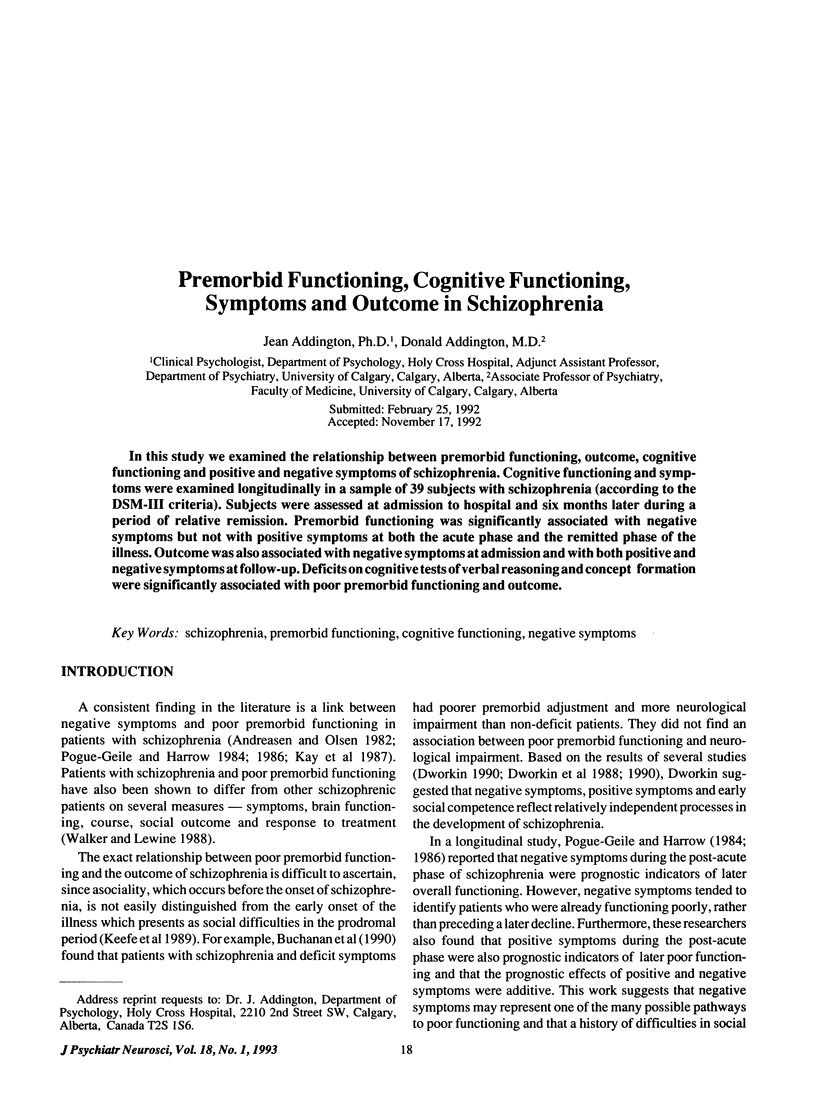
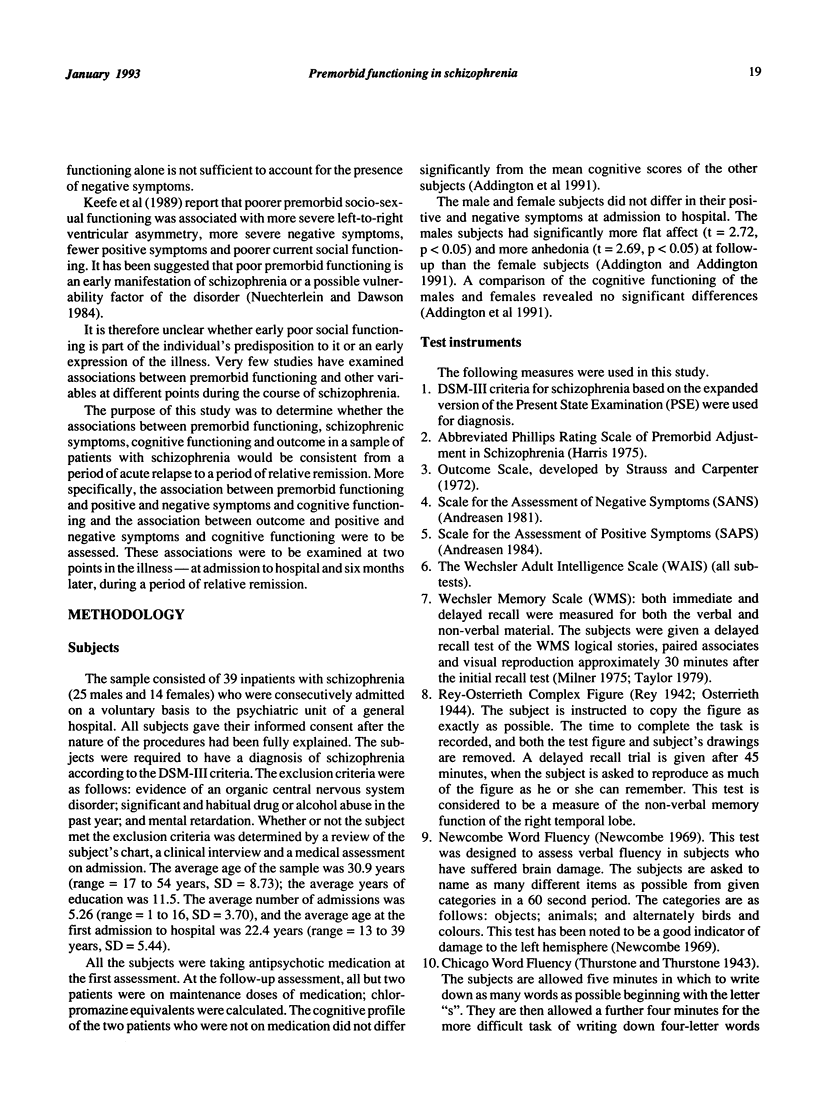
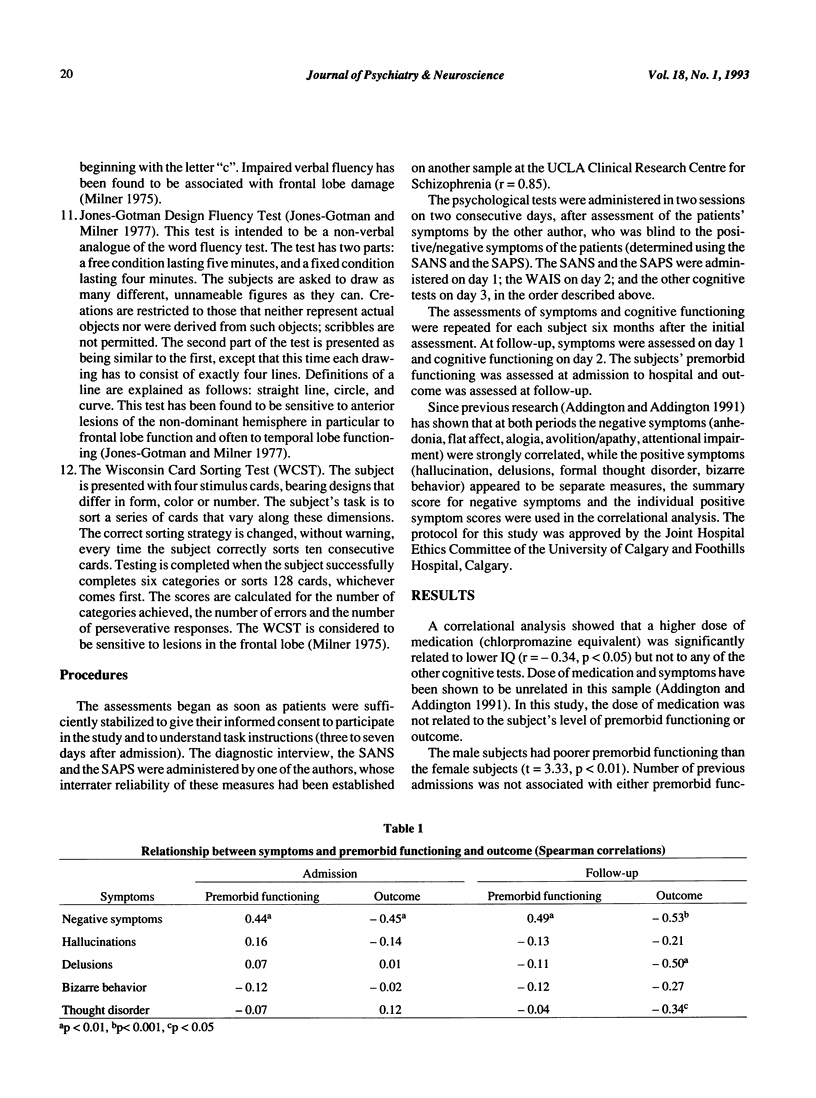
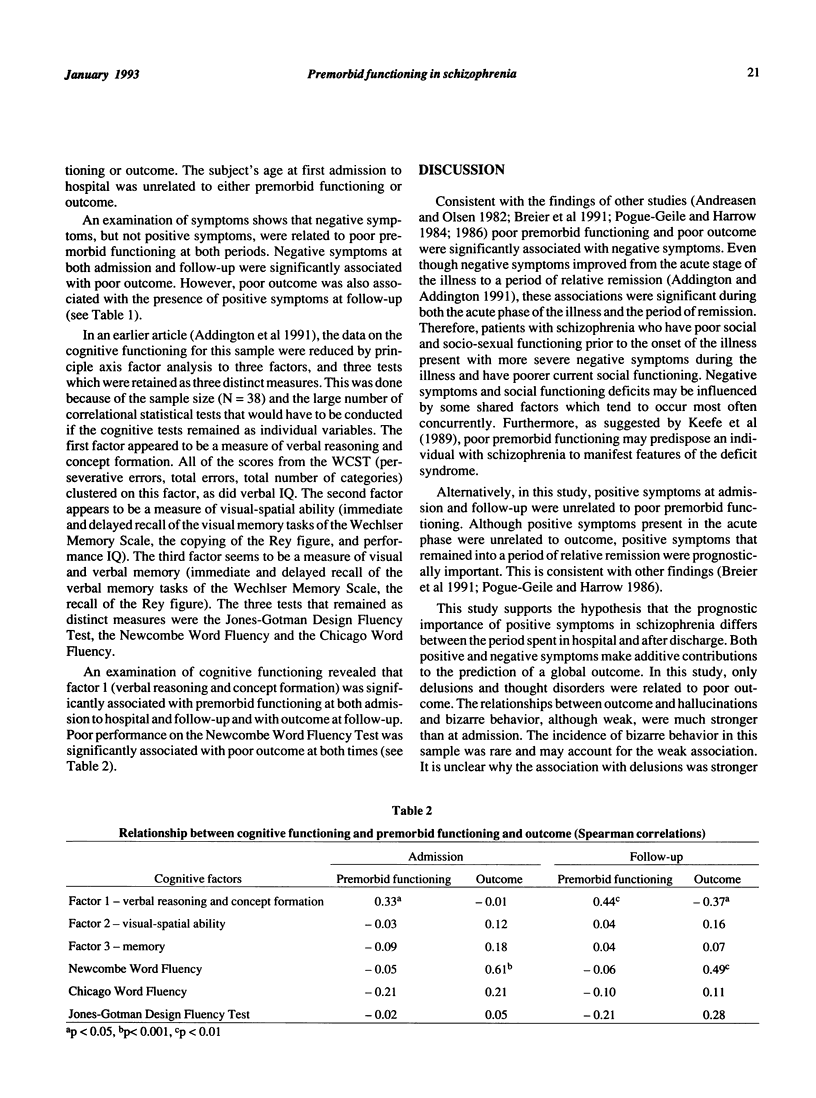
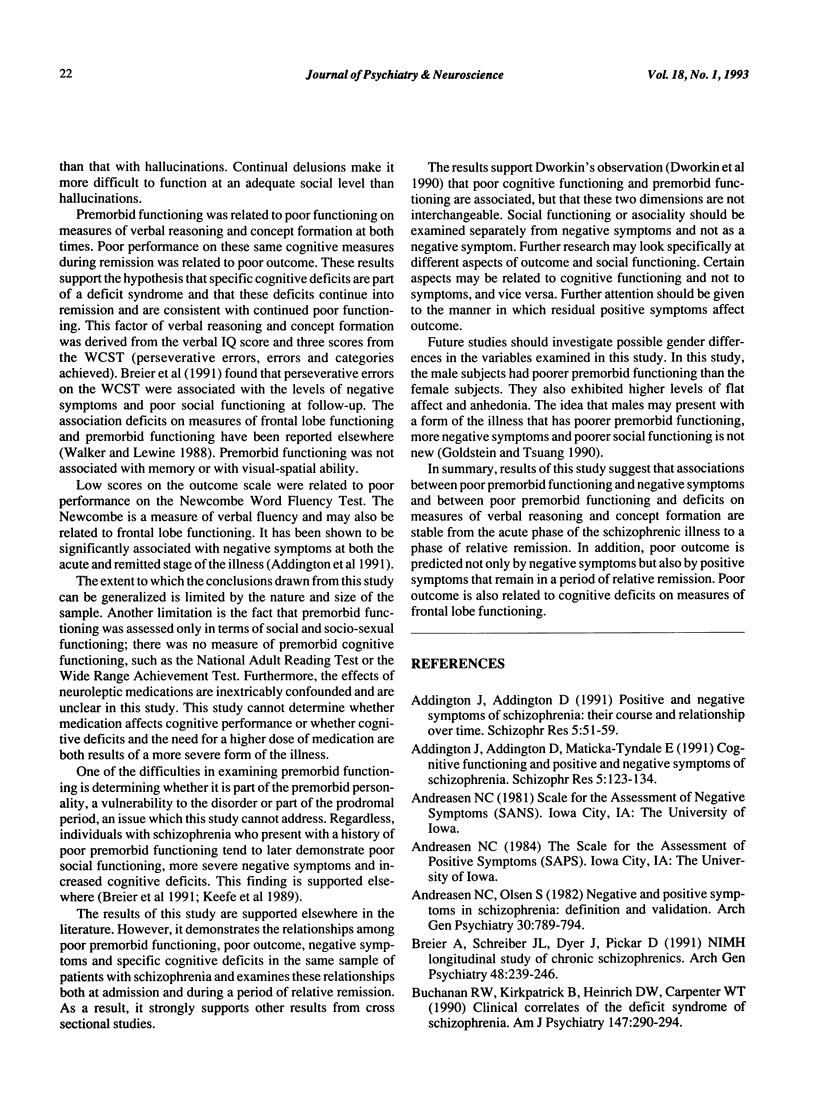
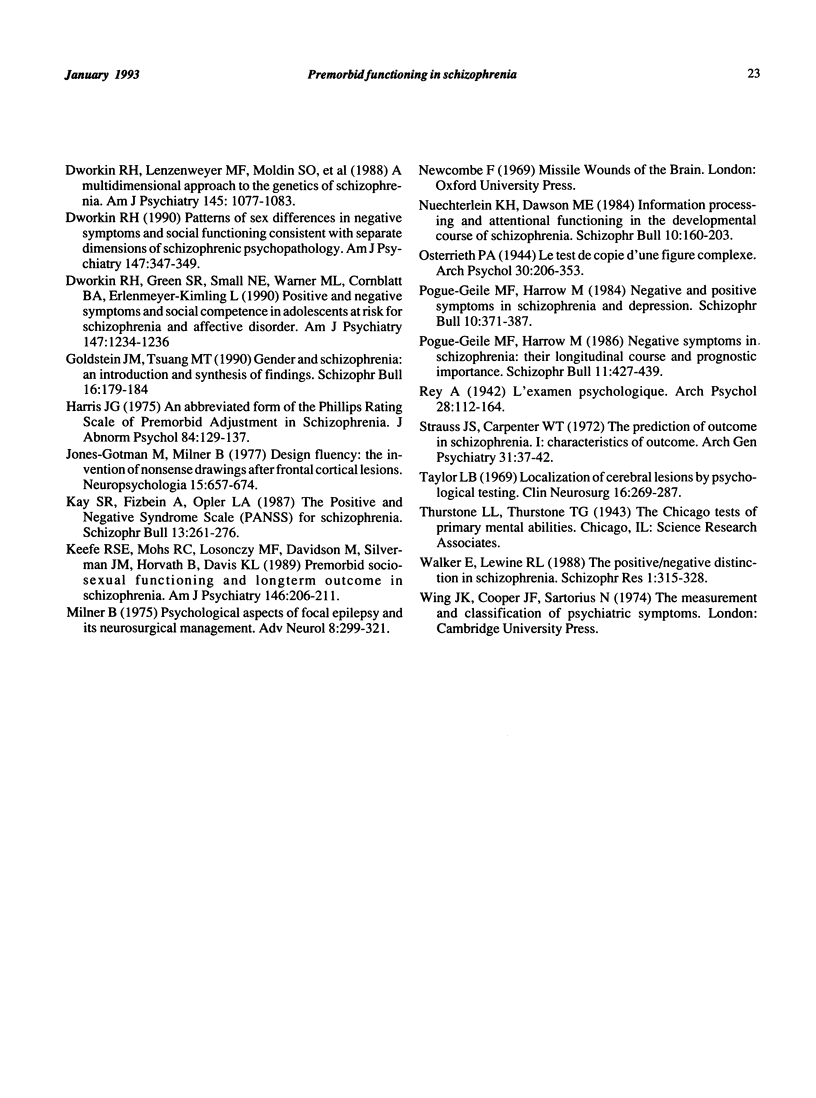
Selected References
These references are in PubMed. This may not be the complete list of references from this article.
- Addington J., Addington D., Maticka-Tyndale E. Cognitive functioning and positive and negative symptoms in schizophrenia. Schizophr Res. 1991 Sep;5(2):123–134. doi: 10.1016/0920-9964(91)90039-t. [DOI] [PubMed] [Google Scholar]
- Addington J., Addington D. Positive and negative symptoms of schizophrenia. Their course and relationship over time. Schizophr Res. 1991 Jul-Aug;5(1):51–59. doi: 10.1016/0920-9964(91)90053-t. [DOI] [PubMed] [Google Scholar]
- Andreasen N. C., Olsen S. Negative v positive schizophrenia. Definition and validation. Arch Gen Psychiatry. 1982 Jul;39(7):789–794. doi: 10.1001/archpsyc.1982.04290070025006. [DOI] [PubMed] [Google Scholar]
- Breier A., Schreiber J. L., Dyer J., Pickar D. National Institute of Mental Health longitudinal study of chronic schizophrenia. Prognosis and predictors of outcome. Arch Gen Psychiatry. 1991 Mar;48(3):239–246. doi: 10.1001/archpsyc.1991.01810270051007. [DOI] [PubMed] [Google Scholar]
- Buchanan R. W., Kirkpatrick B., Heinrichs D. W., Carpenter W. T., Jr Clinical correlates of the deficit syndrome of schizophrenia. Am J Psychiatry. 1990 Mar;147(3):290–294. doi: 10.1176/ajp.147.3.290. [DOI] [PubMed] [Google Scholar]
- Dworkin R. H., Green S. R., Small N. E., Warner M. L., Cornblatt B. A., Erlenmeyer-Kimling L. Positive and negative symptoms and social competence in adolescents at risk for schizophrenia and affective disorder. Am J Psychiatry. 1990 Sep;147(9):1234–1236. doi: 10.1176/ajp.147.9.1234. [DOI] [PubMed] [Google Scholar]
- Dworkin R. H., Lenzenweger M. F., Moldin S. O., Skillings G. F., Levick S. E. A multidimensional approach to the genetics of schizophrenia. Am J Psychiatry. 1988 Sep;145(9):1077–1083. doi: 10.1176/ajp.145.9.1077. [DOI] [PubMed] [Google Scholar]
- Dworkin R. H. Patterns of sex differences in negative symptoms and social functioning consistent with separate dimensions of schizophrenic psychopathology. Am J Psychiatry. 1990 Mar;147(3):347–349. doi: 10.1176/ajp.147.3.347. [DOI] [PubMed] [Google Scholar]
- Harris J. G., Jr An abbreviated form of the Phillips Rating Scale of Premorbid Adjustment in Schizophrenia. J Abnorm Psychol. 1975 Apr;84(2):129–137. doi: 10.1037/h0076983. [DOI] [PubMed] [Google Scholar]
- Jones-Gotman M., Milner B. Design fluency: the invention of nonsense drawings after focal cortical lesions. Neuropsychologia. 1977;15(4-5):653–674. doi: 10.1016/0028-3932(77)90070-7. [DOI] [PubMed] [Google Scholar]
- Kay S. R., Fiszbein A., Opler L. A. The positive and negative syndrome scale (PANSS) for schizophrenia. Schizophr Bull. 1987;13(2):261–276. doi: 10.1093/schbul/13.2.261. [DOI] [PubMed] [Google Scholar]
- Keefe R. S., Mohs R. C., Losonczy M. F., Davidson M., Silverman J. M., Horvath T. B., Davis K. L. Premorbid sociosexual functioning and long-term outcome in schizophrenia. Am J Psychiatry. 1989 Feb;146(2):206–211. doi: 10.1176/ajp.146.2.206. [DOI] [PubMed] [Google Scholar]
- Milner B. Psychological aspects of focal epilepsy and its neurosurgical management. Adv Neurol. 1975;8:299–321. [PubMed] [Google Scholar]
- Nuechterlein K. H., Dawson M. E. Information processing and attentional functioning in the developmental course of schizophrenic disorders. Schizophr Bull. 1984;10(2):160–203. doi: 10.1093/schbul/10.2.160. [DOI] [PubMed] [Google Scholar]
- Pogue-Geile M. F., Harrow M. Negative and positive symptoms in schizophrenia and depression: a followup. Schizophr Bull. 1984;10(3):371–387. doi: 10.1093/schbul/10.3.371. [DOI] [PubMed] [Google Scholar]
- Pogue-Geile M. F., Harrow M. Negative symptoms in schizophrenia: their longitudinal course and prognostic importance. Schizophr Bull. 1985;11(3):427–439. doi: 10.1093/schbul/11.3.427. [DOI] [PubMed] [Google Scholar]
- Strauss J. S., Carpenter W. T., Jr The prediction of outcome in schizophrenia. II. Relationships between predictor and outcome variables: a report from the WHO international pilot study of schizophrenia. Arch Gen Psychiatry. 1974 Jul;31(1):37–42. doi: 10.1001/archpsyc.1974.01760130021003. [DOI] [PubMed] [Google Scholar]
- Taylor L. B. Localisation of cerebral lesions by psychological testing. Clin Neurosurg. 1969;16:269–287. doi: 10.1093/neurosurgery/16.cn_suppl_1.269. [DOI] [PubMed] [Google Scholar]
- Walker E., Lewine R. J. The positive/negative symptom distinction in schizophrenia. Validity and etiological relevance. Schizophr Res. 1988 Sep-Oct;1(5):315–328. doi: 10.1016/0920-9964(88)90045-x. [DOI] [PubMed] [Google Scholar]


